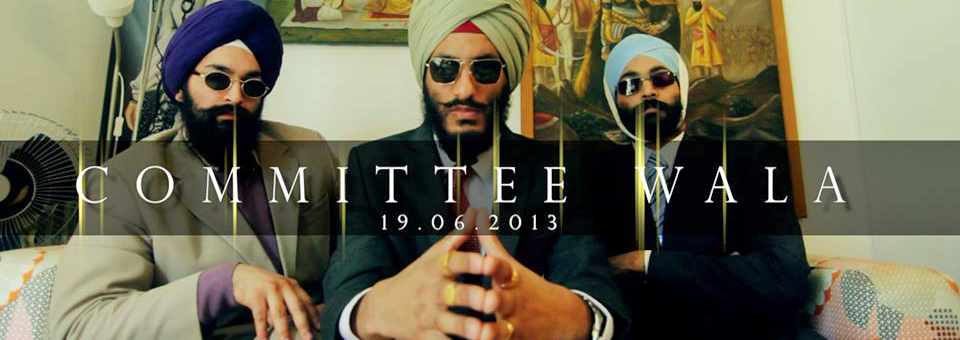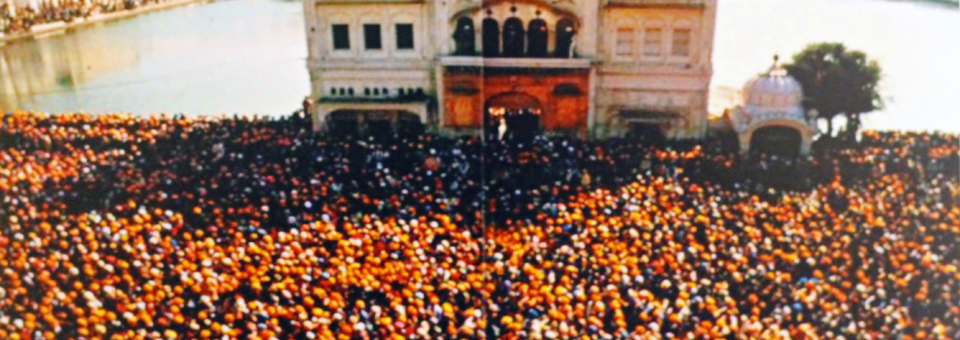Disclaimer: I was a small part of the production team that created ‘Committee Wala’
Think of a Mercedes Benz, gold rings and sharp suits. The first image that comes to mind might not ordinarily be that of a Punjabi man, but if you follow the goings on in Gurdwara management it might make sense. ‘Committee Wala’ is a new parody music video that sends-up the worst of Gurdwara committee members and I would like to hope that its release will instigate a public conversation about our relationship with the institution of Gurdware. This article is my submission to do just that – and hopefully the first of more to come on this issue.
Last year a parody video that sent-up fake babas was published to Youtube and became a talking point in intellectual Sikh circles. That video based on Kanye West’s ‘Ni**as in Paris’ record was created by Narvir Singh, a young film-maker who works regularly with us here at Naujawani.com. At the time I wrote an article to explain why I supported such entertainment that came with a purpose and went some way towards nullifying the expected backlash that came from those people who felt the video attacked their baba. With the release of ‘Committee Wala’ – again a parody of a Kanye West record, ‘Mercy’ – I felt that I might have to do more of the same, but mostly I won’t be, suffice to say that this type of video is intended to highlight the worst elements from amongst a section of our community and should in no way be deemed a reflection of all Gurdwara committee members.
I am fully aware that our community is as yet in a maturing stage, but even still we would do well to remember that the whole World does not revolve around us as individuals, nor is every criticism aimed at us personally. Those people who watch ‘Committee Wala’ and feel enraged might like to think of why they feel so insulted. Does the video hold some truth to actions that they have seen others commit but have not challenged? Does the idea of using religion to enhance ones own standing or to make money fall too close to home in a non-Gurdwara way? Or are they concerned that a public conversation about the practice of running Gurdware by committees might threaten the stranglehold exerted over the way we practice Sikhi?
Having watched the video and been involved in its creation (to an extent), it raises the vitally important question of what we see the purpose of a Gurdwara as being today. There will be a range of answers to this question which I will tackle in detail in a future article, but for me the Gurdwara is and always will be a place to learn from Guru Nanak in the company of others. I happily accept that under such a simple definition, it might be difficult for some to see how this can encompass conferences, sport and familial engagements which dominate the Gurdwara on a day-to-day basis, but I can assure you it does even if those activities would not look the way we organise them today. A secondary question that the video provokes pertains to the establishment of a priestly class in Sikhi, and I’m not just talking about Granthis. We are living in a World where knowledge, reason and discourse are being substituted in the House of Guru Nanak by patronage and mistaken tokens of respect. It is more often who you know, how loud you can shout and misconceived ideas of success that win a person a place on committees.
Corruption exists in all walks of life and sadly the Gurdwara has become no different; we can’t escape that fact. Over twenty five years in which I have spent umpteen hours every week in Gurdware, I have seen this issue brushed under the carpet repeatedly. Granted, it is widely rebuked when raised and seen as a shameful happening in wider society, but this is where the story ends. There is no conversation as to how the root cause of this problem can be rectified and prevented in accordance with the teachings of the Guru. Be under no illusions that committees are a new invention. They were not part of a system devised by the Guru to manage Sikh institutions or affairs. An alternative system does exist in a very few number of places based on the concept of selecting five Khalse from amongst the congregation, but even that is far from the finished article of political manifestations as espoused by Guru Nanak.
This idea of selection and not election is at the heart of where corruption has taken hold over Sikh Gurdware. There are some positions that are necessitated to run any major community building these days, but we are in my experience the only major faith group that has handed over the reigns of custodianship to those who serve janitorial purposes. This is not to say that one cannot engage in both of course, but in throwing the baby out with the bath water, we have forgotten that these are very separate roles requiring entirely different skill-sets.
As I stated at the onset of this article, I will be exploring the institution of Gurdware in future articles and hope to learn more from that experience as well as the conversations that follow. For now I would like to think that this enjoyable and thought-provoking ‘Commitee Wala’ video will inspire Sikhs to talk about what the Gurdwara means to them and what role it is likely to play in their future. Once we begin to open up personally, we can see how our thoughts fit with Gurmat principles, the way that our Guru intended us to proceed. Only then can we make a change for the better for good. Our circumstances as a Panth are of our own making; the Sangat is passive and outside of Guru Nanak’s great revolution. Like the film-maker has exemplified, let’s change that.





